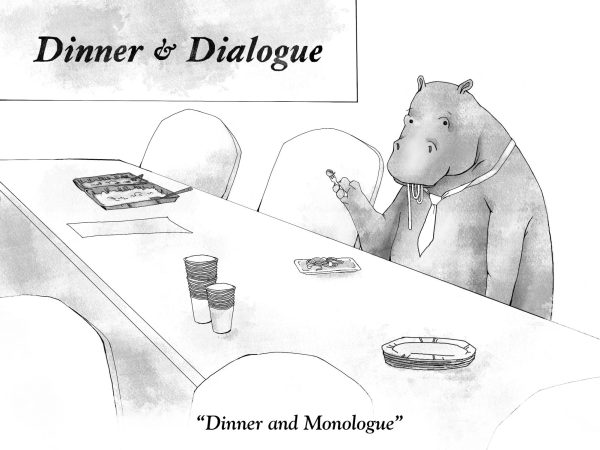After the fallout of the Israel-Hamas war tore apart the GW community last semester, officials are trying to stitch the University back together.
Officials’ new approach to addressing community unrest, called “Strengthening our Community in Challenging Times,” is a sensible attempt to address divisions among students and faculty. But it remains to be seen just how far the University will tolerate students’ and professors’ perspectives, including those that are controversial, objectionable or even hateful.
As a private institution, GW isn’t bound by the First Amendment. However, the University’s re-outlined free expression policy says it will continue to provide students and faculty with speech and expression protections that uphold “academic freedom, free inquiry and free expression.”
Yet, as officials’ initial uncertainty over whether or not to stop members of Students for Justice in Palestine at GWU from projecting messages on Gelman Library last semester demonstrates, unclear speech policies cause confusion. While GW’s new plan is still being developed, officials risk relying on their personal judgment rather than a coherent policy.
Other aspects of the University’s plan also deserve scrutiny. Utah Gov. Spencer J. Cox is welcome to speak on campus, but it will take more than a repackaged School of Media & Public Affairs event to quell campus unrest and unease. The new “Dinner & Dialogue” series drew just three students to its first event — attendance was too low and officials were too cagey to make much of an impact.

The University cannot bear all the blame for low student turnout. Students can choose to participate in these events, and their participation is crucial in closing the rift on campus. But an open dialogue works both ways: Students who feel GW isn’t listening to them are looking for something more than a discussion about civility or political polarization.
Granted, offering affinity spaces for people impacted by the Israel-Hamas War and providing some guidance for students who have been doxxed deserves some praise. And enhancing religious programming on campus could provide students with much-needed community across faiths and cultures.
But as officials admit, this plan is still very much under construction. No matter the details of the plan that comes to pass, GW is never going to allow total freedom when it comes to speech and protest, and understandably so. Universities require a baseline of mutual respect and civility to function: Students have to go to class, and professors and staff have work to do.
At the same time, the entirety of University President Ellen Granberg’s plan assumes students want to participate in these events and work toward a future together. But the members of GW’s community who could benefit the most from these dialogues — those who rightly or wrongly distrust officials — are the same people who’d seem most likely to skip them. Who, or what, will break this deadlock?
The editorial board consists of Hatchet staff members and operates separately from the newsroom. This week’s staff editorial was written by Editorials Assistant Paige Baratta based on discussions with Contributing Culture Editor Jenna Baer, Opinions Editor Ethan Benn, Contributing Social Media Director Anaya Bhatt, Contributing Opinions Editor Riley Goodfellow and Social Media Director Ethan Valliath.

